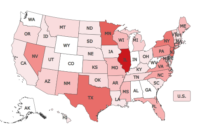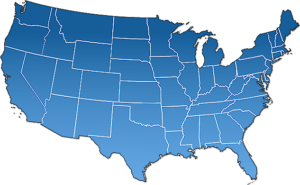 All things considered, it’s been a pretty good year for public notice.
All things considered, it’s been a pretty good year for public notice.
PNRC has been tracking about 150 separate bills introduced in 2017 or carried over from the previous year that relate to public notice. Most would have curtailed newspaper notice in some way, but 21 percent would have created additional notice requirements. To be sure, all of the latter addressed narrow circumstances like relocating the contents of a grave or tomb in Florida, or granting flood control district easements without public auction in Arizona. Nevertheless, it’s a clear sign that many public officials understand the continuing value of print as a distribution system for public notice in the digital age.
North Carolina County Requests Own Local Notice Bill
 Rockingham County’s Board of Commissioners last month approved a referendum asking the state legislature to allow all government units in Rockingham to publish public notices on the county’s official website rather than in local newspapers.
Rockingham County’s Board of Commissioners last month approved a referendum asking the state legislature to allow all government units in Rockingham to publish public notices on the county’s official website rather than in local newspapers.
The resolution specifically referenced the General Assembly’s passage two weeks earlier of Sen. Trudy Wade’s (R-Guilford) Senate Bill 181, which authorized neighboring Guilford County to move all public notices in the county from newspapers to its official website. Wade’s bill was almost identical to House Bill 205, an earlier measure she backed that passed the legislature this summer but was swiftly vetoed by Governor Roy Cooper (D). However, unlike HB 205, Wade’s latest effort to eliminate newspaper notice was drafted as a veto-proof “local” bill.
N.C. Public Notice Legislation Resurrected as Local Bill
 North Carolina State Sen. Trudy Wade’s battle to eliminate public notice in newspapers is set to move to a new front this week. According to the News & Record, the state legislature is expected to consider a local version of her public notice bill when it reconvenes on Wednesday.
North Carolina State Sen. Trudy Wade’s battle to eliminate public notice in newspapers is set to move to a new front this week. According to the News & Record, the state legislature is expected to consider a local version of her public notice bill when it reconvenes on Wednesday.
Wade’s previous public notice bills have been state legislation. Even her measure that was vetoed in July by Gov. Roy Cooper — which had been amended minutes before it passed to focus solely on Guilford County — was a North Carolina bill. Like that bill, her latest effort would affect only Guilford County, but it has been written as a piece of local legislation. Local legislation can’t be vetoed by the governor.
N.C. Governor’s Public Notice Veto Still Stands
 This story was updated on Sept. 5.
This story was updated on Sept. 5.
North Carolina Gov. Roy Cooper’s veto of a bad public notice bill is safe for now.
The state’s legislature adjourned for the year on Aug. 31 without ever having voted whether to overturn the governor’s veto of HB 205, Sen. Trudy Wade’s (R-Guilford) apparent effort to punish the newspapers in her district.
N.C. County Targeted in Public Notice Bill
 If at first you don’t succeed, try, try again.
If at first you don’t succeed, try, try again.
North Carolina State Senator Trudy Wade (R-Greensboro, photo on left) heeded that advice and last week finally succeeded in passing a bill that makes government less transparent.
After her two previous efforts to move public notice in the state from newspapers to government websites failed, in March Wade introduced another sweeping revision of the state’s public notice laws. When her bill stalled in the House, as it had in the previous legislative session, Wade didn’t give up.
Dark Clouds Dissipate on Legislative Front
 The year began with a bang but may end with a whimper.
The year began with a bang but may end with a whimper.
Legislation that would fundamentally alter public notice laws has been introduced in 21 states in 2017, and several of those bills once had real momentum. But with Memorial Day now behind us, 36 state legislatures have already adjourned and not a single one of those formerly worrisome bills is close to passage.
The latest threat to subside was in Missouri, where newspapers had been nervous about two separate bills that were reported out of committee. One would have moved municipal notices to government websites and the other threatened to shift foreclosure notices to websites operated by law firms. The clock ran out on both bills when the legislature adjourned in mid-May.
Maine’s Governor Vetoes Another Public Notice Bill
 As we noted last month, Maine Gov. Paul LePage doesn’t like the newspapers in his state. There’s now evidence to suggest his disgust for print-based local journalism provokes him to stake out irrational positions on public notice bills.
As we noted last month, Maine Gov. Paul LePage doesn’t like the newspapers in his state. There’s now evidence to suggest his disgust for print-based local journalism provokes him to stake out irrational positions on public notice bills.
In April, LePage vetoed a bill requiring newspapers to continue posting public notices on their own websites at no extra cost to the state. The veto was counterintuitive but it had an internal logic. LePage doesn’t believe in half measures. He is convinced that newspapers are dying but he’s an impatient man, so he wants to do all he can to hasten their demise.
Another Governor Takes Aim at Public Notice
 We have found a governor whose animus for newspapers may exceed Chris Christie’s.
We have found a governor whose animus for newspapers may exceed Chris Christie’s.
Maine Gov. Paul LePage (photo on left) dislikes the papers in his state so intensely he vetoed a bill last month requiring them to continue to post public notices on their own websites at no extra charge to the state. Overwhelming majorities in the legislature overrode his veto the following week.
Nevada the Latest Public Notice Trouble Spot
 Legislation that would authorize radio and television station websites to publish public notices in Nevada has become a serious threat to newspapers in the state, according to the Nevada Press Association (NPA). Senate Bill 218 would establish broadcaster websites as an alternative to newspapers for all legislatively mandated notices in the state, including foreclosure and other private-party notices.
Legislation that would authorize radio and television station websites to publish public notices in Nevada has become a serious threat to newspapers in the state, according to the Nevada Press Association (NPA). Senate Bill 218 would establish broadcaster websites as an alternative to newspapers for all legislatively mandated notices in the state, including foreclosure and other private-party notices.
Wisconsin, Missouri on High Alert as Public Notice Bills Churn Through State Legislatures
 More than 120 public notice bills have been introduced in at least 37 different states through the first week of March, raising varying levels of concern among newspaper publishers and state press associations around the country. The only states where the danger signs are flashing red, however, appear to be Wisconsin and Missouri.
More than 120 public notice bills have been introduced in at least 37 different states through the first week of March, raising varying levels of concern among newspaper publishers and state press associations around the country. The only states where the danger signs are flashing red, however, appear to be Wisconsin and Missouri.
